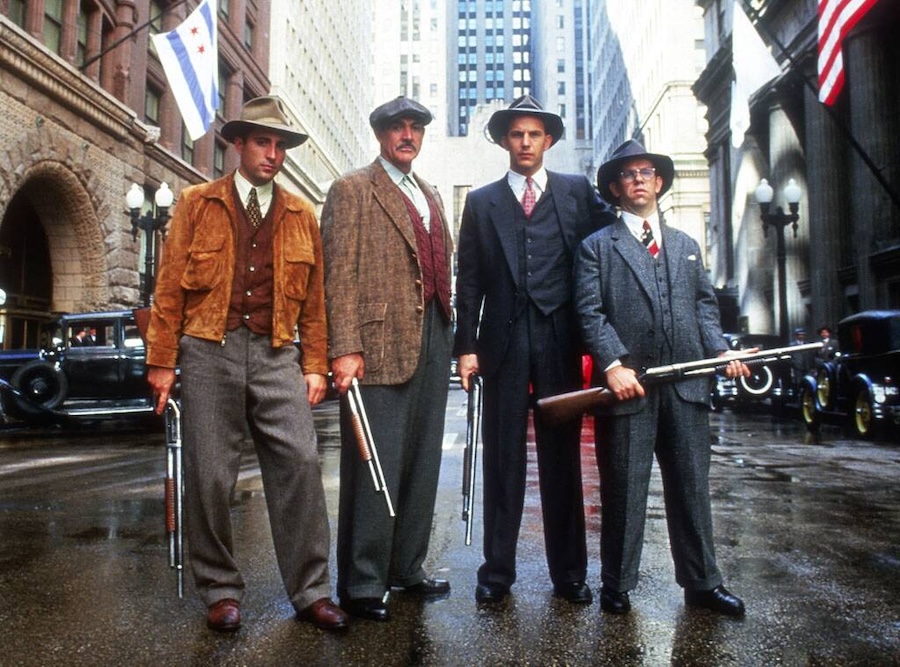
AL CAPONE. HE RULED CHICAGO WITH ABSOLUTE POWER. NO ONE COULD TOUCH HIM. NO ONE COULD STOP HIM. UNTIL ELIOT NESS AND A SMALL FORCE OF MEN SWORE THEY’D BRING HIM DOWN.

In 1987, Brian De Palma was not looking good at all. After Body Double (1984) and Wise Guys (1986), two films you might call failures, the director seemed to have lost his touch. His next project didn’t look too promising either – an adaptation of an old TV show that had starred Robert Stack. Fortunately, The Untouchables turned out to be a masterpiece, De Palma’s best film.
An empire built on bootlegging
The year is 1930 and it’s the era of the Prohibition. Chicago has a mayor, but he doesn’t really run the city. Al Capone (Robert De Niro) does, a gangster who has built his empire on bootlegging. It appears as if Capone has everyone who can challenge him in his pocket. This is the situation Treasury agent Eliot Ness (Kevin Costner) faces when he arrives in Chicago to put Capone away. He can’t trust anyone – except for Jim Malone (Sean Connery), an old Irish-American cop who’s still on the beat and who teaches him how to get Capone the Chicago way. They get additional muscle from George Stone (Andy García), the finest shooter among the new police recruits, and Oscar Wallace (Charles Martin Smith), an FBI accountant who might just have found a way how to get Capone convicted in a court of law.
The road that leads to justice is filled with death and sorrow for these men; this is a film about courage, about choosing to go to war, fully knowing that it could mean sacrificing your life. It’s a tough and violent gangster movie, just as operatic in style as the director’s previous Scarface (1983), but much more focused on telling its explosive story without any digressions.
Richly emotional and exciting music
Only the best are involved in the production. Giorgio Armani designed the gorgeous costumes, including the ironically white one which is worn by the murderous mobster Frank Nitti; Ennio Morricone wrote music that is both richly emotional and exciting and David Mamet filled his screenplay with dialogue that grabs your attention. Together with cinematographer Stephen H. Burum, De Palma staged scenes that are cinema at its most effective and brilliant. They include the one where Capone shockingly beats one of his minions to death with a baseball bat (apparently, that happened in real life), and the scene at the Union Station where a baby carriage accidentally starts rolling down the stairs in the middle of a shootout – an ingenious concept borrowed from Potemkin (1925).
Sean Connery revived his career and turns in a brilliant performance as the leathery old veteran.
Costner, in his breakthrough, is ideal as the honest hero who won’t accept what passes for law in Chicago. De Niro gained weight for his performance and gives the legendary mobster a sense of grandeur. Connery revived his career and turns in a brilliant performance as the leathery old veteran; he plays the scene where he meets his destiny beautifully and thoroughly convinces us and Ness of the need to take extraordinary measures in the fight against evil. As a counterbalance, Smith provides just the right kind of comic relief as the enthusiastic accountant.
Prohibition was never worth defending, but the campaign against Capone was about other things than liquor. The reason why The Untouchables has become an enduring classic is not just because brilliant people gave their very best in making it. There is something profoundly satisfying in watching ordinary people rise to a challenge that looks insurmountable, pay dearly for doing so, but in the end still carry the day. We see this theme over and over again in American films, not least in Westerns, but this is one of those occasions where the fight seems novel, genuine, heartbreaking and inspiring.
The Untouchables 1987-U.S. 119 min. Color. Widescreen. Directed by Brian De Palma. Screenplay: David Mamet. Cinematography: Stephen H. Burum. Music: Ennio Morricone. Cast: Kevin Costner (Eliot Ness), Sean Connery (Jim Malone), Charles Martin Smith (Oscar Wallace), Andy García (George Stone), Robert De Niro (Al Capone), Richard Bradford, Patricia Clarkson.
Trivia: Bob Hoskins and Jack Nicholson were originally considered for the part of Al Capone; Mel Gibson, Don Johnson and Harrison Ford as Eliot Ness. The TV series ran from 1959-1963.
Oscar: Best Supporting Actor (Connery). BAFTA: Best Music. Golden Globe: Best Supporting Actor (Connery).
Quote: “You wanna know how you do it? Here’s how, they pull a knife, you pull a gun. He sends one of yours to the hospital, you send one of his to the morgue! That’s the Chicago way, and that’s how you get Capone!” (Connery to Costner)
Last word: “Being a writer myself, I don’t like to take credit for things I didn’t do. I didn’t develop this script. David [Mamet] used some of my ideas and he didn’t use some of them. I looked upon it more clinically, as a piece of material that has to be shaped, with certain scenes here or there. But as for the moral dimension, that’s more or less the conception of the script, and I just implemented it with my skills – which are well developed. It’s good to walk in somebody else’s shoes for a while. You get out of your own obsessions; you are in the service of somebody else’s vision, and that’s a great discipline for a director.” (De Palma, The New York Times)
